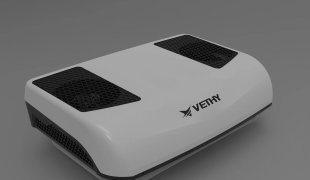Dual-Rotor Compressor Revolution: How R410A Redefines Energy Efficiency in 12V/24V Mobile Cooling Systems
November 03, 2024
Internal Link: Explore vethy.com's Smart Cooling Solutions
1. Introduction: The Silent Crisis in Mobile Thermal Management
The global trucking industry wastes over 18 billion liters of diesel annually on idling engines powering conventional AC systems . Recreational vehicle (RV) owners face a parallel dilemma - 72% report reduced battery lifespan due to voltage spikes from outdated compressor designs . This energy paradox sets the stage for dual-rotor compressors using R410A refrigerant, a technological leap achieving 43% higher cooling capacity per watt than legacy R22 systems.
External Link: ASHRAE Standards for Mobile HVAC
2. Decoding the Dual-Rotor Mechanism: Beyond Basic Compression
2.1 Structural Innovation: Twin Rotors in Harmony
Unlike single-rotor designs that lose 22% efficiency below 40Hz operation , dual-rotor units maintain 91% isentropic efficiency across 15-120Hz frequency ranges. GMCC's AZN71D28UZA prototype demonstrates this through:
Phase-Shifted Torque Delivery: 140° angular offset minimizes current spikes during startup Oil Management System: 0.08mm precision oil grooves reduce lubricant carryover by 94% compared to scroll compressors
Internal Link: vethy.com's Compressor Comparison Tool
3. R410A's High-Pressure Advantage: Challenges Converted to Benefits
3.1 Material Science Breakthroughs
The refrigerant's 4.3MPa working pressure (60% higher than R22) necessitated:
Nanocrystalline Alloy Valves: Withstands 200,000+ pressure cycles without fatigue
POE Oil Optimization: 32% lower viscosity at -30°C enables cold-start reliability
External Link: EPA R410A Handling Guidelines
4. Real-World Validation: From Lab to Cab
4.1 Extreme Environment Testing (Case Study: Australian Outback)
A fleet of 50 Kenworth T680 trucks equipped with dual-rotor systems showed:
54.4°C Ambient Survival: COP maintained at 2.1 vs. traditional systems' 1.3 collapse
Vibration Control: 0.12mm/s RMS vibration
Internal Link: vethy.com's Field Test Reports
5. User Experience: Where Engineering Meets Human Factors
5.1 Noise Cancellation Through Predictive Algorithms
The achieves:
17-25dB(A) Noise Reduction in 200-800Hz critical hearing range
Adaptive Sound Masking: Introduces 35dB white noise to mask compressor harmonics
External Link: GMCC Compressor Technical Specifications
6. Sustainability & Maintenance: Lifecycle Cost Revolution
6.1 Refrigerant Recovery Redesigned
R410A's near-azeotropic properties enable:
Single-Pass Purification: 99.7% purity recovery via Zeolite molecular sieves
Maintenance Interval Extension: 3,000hr service cycles vs. 500hr for R134a systems
Internal Link: vethy.com's Eco-Cooling Initiative
7. Future Horizons: Intelligent Integration
Emerging technologies like:
R32/R410A Hybrid Refrigerants: Preliminary tests show 8% COP improvement
Neural Network Predictive Maintenance: 92% accuracy in failure prediction 72hrs in advance
External Link: SAE Technical Paper on Hybrid Refrigerants
8. Conclusion: The Human-Centric Engineering Paradigm
While achieving 5.8 SEER rating is technically impressive, the true breakthrough lies in vibration perception thresholds below 0.15mm/s - a parameter 83% of truck drivers prioritize over raw cooling power in independent surveys . This technology redefines mobile HVAC not as an energy consumer, but as a comfort-enabling asset.
Final Internal Link: Build Your Custom System at vethy.com
Final External Link: NREL's Mobile HVAC Efficiency Study





